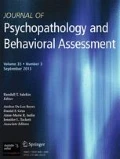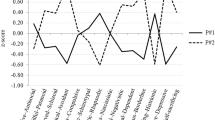Abstract
We conducted five studies with depressed patients, demographically matched controls, and college students to develop and psychometrically evaluate new measures of concerns about interpersonal relationships (sociotropy) and autonomous achievement (autonomy), constructs that have been proposed to confer vulnerability to depression. The final version of the Personal Style Inventory (PSI) Sociotropy and Autonomy scales showed a good factor structure, internal consistency reliability, and test-retest stability, a low correlation with each other, and weak or no gender differences. Convergent and discriminant validity were examined with respect to depressive symptom levels, the Dependency and Self-Criticism scales of the Revised Depressive Experiences Questionnaire, and a social desirability scale and were generally acceptable. Further evaluations of the construct validity of the PSI are indicated.
Similar content being viewed by others
References
Arieti, S., & Bemporad, J. R. (1980). The psychological organization of depression.American Journal of Psychiatry, 137, 1360–1365.
Barnett, P. A., & Gotlib, I. H. (1988, June).Personality and depression: New scales and a model of relationships. Paper presented at the meeting of the Canadian Psychological Association, Montreal, Quebec.
Beck, A. T., (1983). Cognitive therapy of depression: New perspectives. In P. J. Clayton & J. E. Barrett (Eds.),Treatment of depression: Old controversies and new approaches (pp. 265–290) New York: Raven Press.
Beck, A. T., Rush, A. J., Shaw, B. F., & Emery, G. (1979).Cognitive therapy of depression. New York: Guilford.
Beck, A. T., Epstein, N., Harrison, R. P., & Emery, G. (1983).Development of the Sociotropy-Autonomy Scale: a measure of personality factors in psychopathology, Unpublished manuscript. Philadelphia: University of Pennsylvania.
Blaney, P. H., & Kutcher, G. S. (1991). Measures of depressive dimensions: Are they interchangeable?Journal of Personality Assessment, 56, 502–512.
Blatt, S. J., & Maroudas, C. (1992). Convergences among psychoanalytic and cognitive-behavioral theories of depression.Psychoanalytic Psychology, 9, 157–190.
Blatt, S. J., & Shichman, S. (1983). Two primary configurations of psychopathology.Psychoanalysis and Contemporary Thought, 6, 187–254.
Blatt, S. J., & Zuroff, D. C. (1992). Interpersonal relatedness and self-definition: Two prototypes for depression.Clinical Psychology Review, 12, 527–562.
Blatt, S. J., D'Affliti, J. P., & Quinlan, D. M. (1976). Experiences of depression in normal young adults.Journal of Abnormal Psychology, 85, 383–389.
Blatt, S. J., Quinlan, D. M., Chevron, E. S., McDonald, C., & Zuroff, D. (1982). Dependency and self-criticism: Psychological dimensions of depression.Journal of Consulting and Clinical Psychology, 50, 113–124.
Bowlby, J. (1977). The making and breaking of affectional bonds. I. Aetiology and psychopathology in the light of attachment theory.British Journal of Psychiatry, 130, 201–210.
Cane, D. B., Olinger, L. J., Gotlib, I. H., & Kuiper, N. A. (1986). Factor structure of the dysfunctional attitude scale in a student population.Journal of Clinical Psychology, 42 307–309.
Carver, C. S., Scheier, M. F., & Weintraub, J. K. (1989). Assessing coping strategies: A theoretically based approach.Journal of Personality and Social Psychology, 56, 267–283.
Crowne, D., & Marlowe, D. (1964).The approval motive. New York: Wiley.
DeVellis, R. F. (1991).Scale development: Theory and applications. Newbury Park, CA: Sage.
Gilbert, P., & Reynolds, S. (1990). The relationship between the Eysenck Personality Questionnaire and Beck's concepts of sociotropy and autonomy.British Journal of Clinical Psychology, 29, 319–325.
Hammen, C., Ellicott, A., & Gitlin, M. (1989). Vulnerability to specific life events and prediction of course of disorder in unipolar depressed patients.Canadian Journal of Behavioural Science, 21, 377–388.
Hirschfeld, R. M. A., Klerman, G. L., Gough, H. G., Barrett, J., Korchin, S. J., & Chodoff, P. (1977). A measure of interpersonal dependency.Journal of Personality Assessment, 41, 610–618.
Hirschfeld, R. M. A., Klerman, G. L., Clayton, P. J., & Keller, M. B. (1983). Personality and depression.Archives of General Psychiatry, 40, 993–998.
Hirschfeld, R. M. A., Klerman, G. L., Clayton, P. J., Keller, M. B., McDonald-Scott, P., & Larkin, B. H. (1983). Assessing personality: Effects of the depressive state on trait measurement.American Journal of Psychiatry, 140, 695–699.
Horowitz, L. M., Rosenberg, S. E., Baer, B. A., Ureno, G., & Villasenor, V. S. (1988). Inventory of Interpersonal Problems: Psychometric properties and clinical applications.Journal of Consulting and Clinical Psychology, 56, 885–892.
Klein, D. N. (1989). The Depressive Experiences Questionnaire: A further evaluation.Journal of Personality Assessment, 53, 705–715.
Kutcher, G. S. (1992).Dependency and self-criticism as predictors of depressed mood states: A test of specificity, Unpublished doctoral dissertation. Coral Gables, FL: University of Miami.
Lorr, M., & Youniss, R. P. (1977). An inventory of interpersonal style.Journal of Personality Assessment, 37, 165–173.
McCrae, R. R., & Costa, P. T., Jr. (1983). Social desirability scales: More substance than style.Journal of Consulting and Clinical Psychology, 51, 882–888.
Miranda, J., & Persons, J. B. (1988). Dysfunctional attitudes are mood-state dependent.Journal of Abnormal Psychology, 97, 76–79.
Mongrain, M., & Zuroff, D. C. (1989). Cognitive vulnerability to depressed affect in dependent and self-critical college women.Journal of Personality Disorders, 3, 240–251.
Nietzel, M. T., & Harris, M. J. (1990). Relationship of dependency and achievement/autonomy to depression.Clinical Psychology Review, 10, 279–297.
Nolen-Hoeksema, S., Morrow, J., & Fredrickson, B. L. (1993). Response styles and the duration of episodes of depressed mood.Journal of Abnormal Psychology, 102, 20–28.
Nunnally, J. C. (1978).Psychometric theory (2nd ed.). New York: McGraw-Hill.
Peselow, E. D., Robins, C. J., Sanfilipo, M. P., Block, P., and Fieve, R. R. (1992). Sociotropy and autonomy: Relationship to antidepressant drug treatment response and endogenous/nonendogenous dichotomy.Journal of Abnormal Psychology, 101, 479–486.
Riley, W. T., & McCranie, E. W. (1990). The Depressive Experiences Questionnaire: Validity and psychological correlates in a clinical sample.Journal of Personality Assessment, 54, 523–533.
Robins, C. J. (1985).Construct validation of the Sociotropy-Autonomy Scale: A measure of vulnerability to depression. Paper presented at the annual meeting of the Eastern Psychological Association, Boston, Apr.
Robins, C. J. (1990). Congruence of personality and life events in depression.Journal of Abnormal Psychology, 99, 393–397.
Robins, C. J. (1994).Interpersonal and achievement concerns as vulnerabilities to psychopathology: A critical review (in preparation).
Robins, C. J., & Block, P. (1988). Personal vulnerability, life events, and depressive symptoms: A test of a specific interactional model.Journal of Personality and Social Psychology, 54, 847–852.
Robins, C. J., and Hayes, A. M. (1993). An appraisal of cognitive therapy.Journal of Consulting and Clinical Psychology, 61, 205–214.
Robins, C. J., & Luten, A. G. (1991). Sociotropy and autonomy: Differential patterns of clinical presentation in unipolar depression.Journal of Abnormal Psychology, 100, 74–77.
Robins, C. J., Block, P., & Peselow, E. D. (1989). Relations of sociotropic and autonomous personality characteristics to specific symptoms in depressed patients.Journal of Abnormal Psychology, 98, 86–88.
Segal, Z. V., Shaw, B. F., Vella, D. D., & Katz, R. (1992). Cognitive and life stress predictors of relapse in remitted unipolar depressed patients: A test of the congruency hypothesis.Journal of Abnormal Psychology, 101, 26–36.
Stewart, B. L., Beck, A. T., & Clark, D. A. (1989).Sociotropy and autonomy: Can depression vulnerability be predicted from personality factors only? Paper presented at the annual meeting of the Association for Advancement of Behavior Therapy, Washington, DC, Nov.
Weissman, A. N., & Beck, A. T. (1978).Development and validation of the Dysfunctional Attitudes Scale: A preliminary investigation. Paper presented at the annual meeting of the American Educational Research Association, Toronto.
Welkowitz, J., Lish, J., & Bond, R. (1985). The Depressive Experiences Questionnaire: Revision and validation.Journal of Personality Assessment, 49, 89–94.
Zuckerman, M., & Lubin, B. (1965).Manual for the Multiple Affect Adjective Checklist. San Diego, CA: Educational and Industrial Testing Service.
Zuroff, D. C., & de Lorimier, S. (1989). Ideal and actual romantic partners of women varying in dependency and self-criticism.Journal of Personality, 57, 826–846.
Zuroff, D. C., & Mongrain, M. (1987). Dependency and self-criticism: Vulnerability factors for depressive affective states.Journal of Abnormal Psychology, 96, 14–22.
Zuroff, D. C., Moskowitz, D. S., Wielgus, M. S., Powers, T. A., & Franko, D. L. (1983). Construct validation of the dependency and self-criticism scales of the Depressive Experiences Questionnaire.Journal of Research in Personality, 17, 226–241.
Zuroff, D. C., Igreja, I., & Mongrain, M. (1990). Dysfunctional attitudes, dependency, and self-criticism as predictors of depressive mood states: A 12-month longitudinal study.Cognitive Therapy and Research, 14, 315–326.
Author information
Authors and Affiliations
Rights and permissions
About this article
Cite this article
Robins, C.J., Ladd, J., Welkowitz, J. et al. The personal style inventory: Preliminary validation studies of new measures of sociotropy and autonomy. J Psychopathol Behav Assess 16, 277–300 (1994). https://doi.org/10.1007/BF02239408
Accepted:
Issue Date:
DOI: https://doi.org/10.1007/BF02239408



